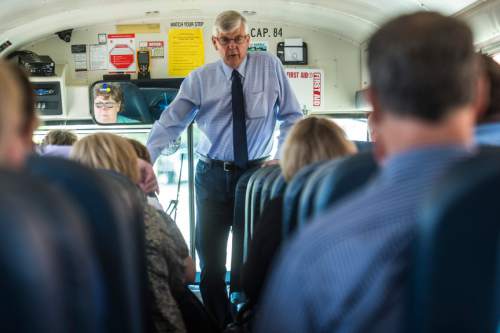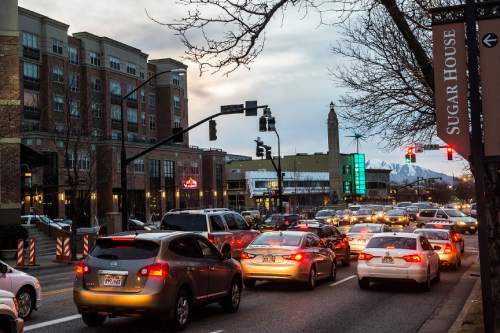This is an archived article that was published on sltrib.com in 2015, and information in the article may be outdated. It is provided only for personal research purposes and may not be reprinted.
Across the Wasatch Front on Tuesday, mayors crowded into meetings with county leaders to urge them to put a proposed sales-tax increase for transportation on the ballot this year.
Riverton Mayor Bill Applegarth told the Salt Lake County Council that a sales-tax vote "is the best way to have increases in taxes — to let the people decide. Our role [as city officials] is to give them good facts and information, let them determine what level of service they want."
The biggest problem facing cities is the need for maintenance work, particularly since the increased demand for bike lanes requires the widening of many existing roads to enhance safety, he said.
"City officials are passionate about this," Applegarth said. "People are riding [bikes] in traffic too much because the roads are too narrow. We worry about that."
Draper Mayor Troy Walker joined the pitch. "It's important for us to go to the taxpayer and say this is our burden and this is what we need to do to fix it," Walker said, arguing that delaying the vote until after the Nov. 3 election will only make maintenance projects more expensive.
The two are far from alone. Fifteen of the 16 cities in Salt Lake County have passed resolutions in support of putting the tax increase on the ballot this year. The last, West Valley City, is expected to approve a resolution at its next meeting, said Sandy Mayor Tom Dolan.
"This is an opportunity for the residents to provide the funding necessary for all of our local governments to succeed," Dolan said.
Similar messages went out in other counties.
"We stand together to urge you, as a commission, to empower voters this November and let them choose whether to invest in transportation in their local communities," Kaysville Mayor Steve Hiatt told the Davis County Commission Tuesday morning.
He spoke on behalf of the 12 of 15 cities in Davis County that have passed resolutions to support hiking the tax by a quarter-cent per $1 in sales, or a penny for every $4. Officials from those cities — and some opposition groups — packed all seats in the commission chambers.
Similar meetings occurred, or were scheduled, in Utah County, where 13 of 22 cities have passed resolutions and Weber County, where 13 of 15 cities passed them.
County leaders listened to the requests Tuesday, but made no decision. They must vote by about Aug. 1 to get the issue on the Nov. 3 ballot.
The Legislature passed HB362 — which officially takes effect Wednesday — to allow counties to put the sales-tax hike on local ballots.
Along the Wasatch Front, that law would give 40 percent of the new revenue to the Utah Transit Authority. Another 40 percent would go to cities and 20 percent to counties for local roads and other transportation projects, including trails and bike paths.
Farmington Mayor Jim Talbot said the local share of state gasoline tax is supposed to cover the cost of local roads. But that tax had not been raised in 18 years — although HB362 will raise it by 5 cents a gallon Jan. 1.
A study by the Utah League of Cities and Towns shows "a 63 percent gap between our communities' transportation needs" and money from the gas tax now, Talbot said. So cities have had to up property taxes or delay maintenance and projects.
"One dollar in investment today saves $15 to $20 in reconstruction later," Hiatt said. "It would seem fiscally irresponsible not to have this conversation to provide communities, transit and government the ability to fund the dollar and save a significant amount later."
Voters should consider the tax hike this year because "our transportation needs are great, they are urgent, they are critical," Hiatt said, and the sooner cities can receive the extra money the better.
However, opponents have urged counties to wait until next year's presidential election to put the issue on the ballot, when turnout is expected to be higher and more voters would have a say.
Billy Hesterman from the Utah Taxpayers Association said residents cannot afford the extra hit of a quarter-cent sales-tax increase on top of legislatively approved increases in gas and property taxes.
"We've come to a point where taxpayers deserve a chance to catch their breath. Putting this on the ballot is just one more stress for a family trying to make ends meet," Hesterman said.
Evelyn Everton of Americans for Prosperity was concerned that 40 percent of the revenue raised would go to UTA, which she argued was "not good stewards in the past with taxpayer money."
Charles Henderson, who represents unincorporated Salt Lake County on the UTA board, disputed her contention, adding that if UTA wasn't a good steward, it wouldn't have 42 million riders a year.
Davis County Commission Chairman P. Bret Millburn, who also is on the UTA Board, said funding transit is important. "Transit affects everybody whether you use it on a regular basis or not. It takes vehicles off the road."
Millburn also said charging a penny for every $4 in sales "doesn't sound like a whole lot."
Weber County Commission Chairman Kerry Gibson said mayors in his county "made a passionate plea" for the tax hike, while others gave equally strong arguments against it — which his commission will consider before making a decision.
Some counties, including Davis and Utah, have other bond and tax issues already on the ballot by cities and school districts. Some officials have expressed concern that too many ballot issues at the same time could doom them all.
But Gibson said he personally believes that "we all agree that we have a problem" with transportation, and "we have the opportunity to address it. To let that opportunity slip away may not be wise."





